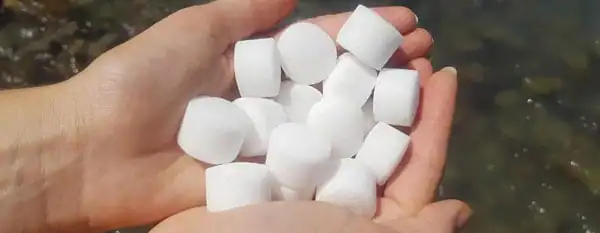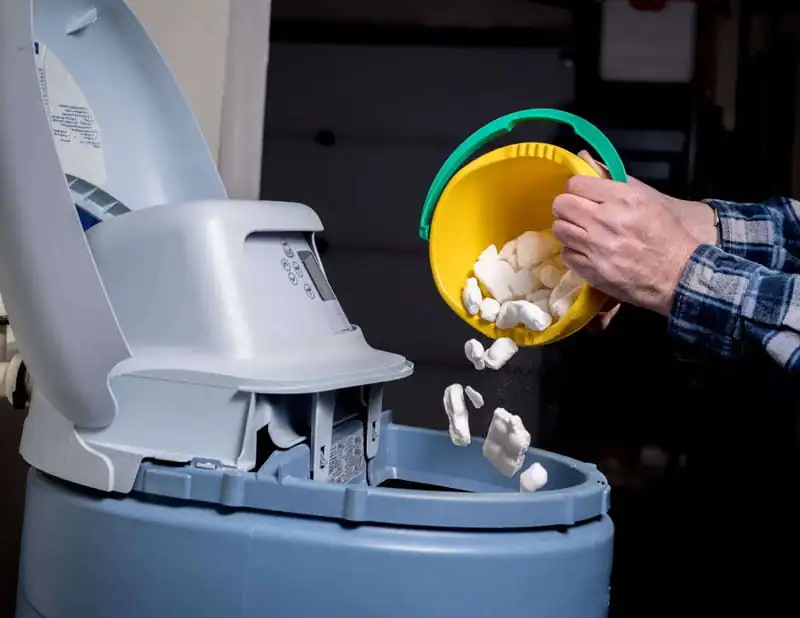There are many household appliances that can use salt and many wonder if these appliances can use salts interchangeably. For instance, can you use pool salt in a water softener?
In general, pool salt can be used in a water softener if care is taken to buy very pure pool salt and to monitor the water softener to make sure the salt dissolves properly without cause Salt Bridges.
Before using pool salt in a water softener, it’s important to make sure your pool salt a high-quality, pure salt that is equivalent to the purity of water softener salt – generally 99.5% pure Sodium Chloride. The other consideration is that pool salt (often sold as crystals or somewhat finely ground) is designed to dissolve quickly – and water softener salt (often sold as pellets) is designed to dissolve more slowly and to not clump.
What is Pool Salt?
Pool salt, fairly high purity sodium chloride, is a type of salt commonly used in swimming pools to maintain sanitize the water, used in conjunction with a Salt Chloride Generator.
Pool salt is typically sold in large bags, with a grain size that is specifically designed for use in swimming pools. When added to a swimming pool, pool salt dissolves quickly and evenly. To learn more about pool sanitation systems that are based on Salt, see: Chlorine to Saltwater Pool Conversion: Can it be Done?
What is a Water Softener?
A water softener is a device that helps remove minerals that cause hard water, such as calcium and magnesium, from the water supply. Hard water can cause several problems, including clogged pipes, water stains, and soap scum buildup. Water softeners work by exchanging the hard minerals for soft ones, such as sodium or potassium, through a process called ion exchange. Most household water softening systems use salt: Sodium Chloride in the softening process. Since we are talking about the exact same salt, it is reasonable to think that the two salt products could be somewhat interchangeable.
To learn more about how Water softeners work and about the different types of water softening systems, please see: How To Calculate The Salt Needed For Your Water Softener.

How Does Pool Salt Differ from Water Softener Salt?
The primary differences fall into the categories of Purity, Additives and Form.
Purity – A good quality Water Softener Salt should be 99.5% or more pure Sodium Chloride. Before using Pool Salt in a Water Softener, your pool salt product should be at least equally pure.
Additives – What is in that other 0.5%? In Water Softener salt, the most common additives are products to deal with water that contains iron. In Pool Salt, the most common additives are things to keep the salt from clumping or things to increase alkalinity/pH buffering.
Form – Pool salt is suppose to dissolve quickly and tends to be sold in small granules or crystals. The most common Water Softener salt is sold in pellets that avoid clumping (and forming salt bridges) in the brine tank.
Before putting Pool Salt in your water softener, it is good to understand more about how your water softener uses salt. We have an in-depth article about that at A Guide To Water Softener Salt: Pellets, Blocks, Cubes or Crystals.
Is it Okay to Use Pool Salt in a Water Softener?
While it is might be okay to use pool salt in your water softener in some circumstance, there are a few caveats.
It is important to check the specifications of your water softener before using pool salt. Some water softeners are designed specifically for use with pellets or may specify the forms of salt that may be used. Some water softener systems may come with warranties that would be voided if you use the wrong type of salt.
Another consideration is the mineral type of salt you are using. Pool salt is almost always made of sodium chloride. However, some people choose to use potassium chloride instead of sodium chloride in their water softener. If you are using potassium chloride, you should not use pool salt as it is not compatible with this type of salt.
While it is possible to use pool salt in a water softener, you need to ask yourself what is the benefit of doing so? Are you trying to use up some leftover pool salt? Is the pool salt cheaper than water softener salt in your area? Is any potential cost savings worth it?
Potential Damage to Your Water Softener
Using pool salt in a water softener can cause potential damage to the system. The brine tank and control valve are two areas that can be affected by the use of pool salt.
Pool salt can contains additives that are not found in water softener salt pellets. These additives can cause salt bridging and clogging in the brine tank, which can disrupt the regeneration process. This can lead to a buildup of dense salt in the tank, which can cause overflow and damage to the control valve.
Additionally, pool salt can contains a higher concentration of magnesium sulfate and alkalinity/pH buffers, which can lead to scaling and buildup in the resin bed. This can cause the resin to become clogged and disrupted, resulting in hard water or eventually having to replace the resin bed.
Before using Pool Salt in your Water Softener system, it is recommended to check whether using anything except water softener salt may void the warranty on the unit. Overall, it is recommended to use only salt pellets specifically designed for water softeners to avoid potential damage and ensure the longevity of the system.
Final Thoughts
While it is possible in specific circumstances to use Pool Salt vs Water Softener salt, the potential issues outweigh the benefits, especially if you don’t have complete information about exactly what is in the salt you are using. Stick to using salt products for the purposes that they are formulated for.







